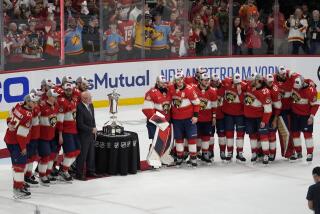NHL’s Winter Classic: Its uniqueness fails to come across on TV
- Share via
Maybe you had to be there. Or not have a sunny, 70-degree day beckoning through open patio doors.
But as viewed through NBC’s cameras the NHL’s Winter Classic, which matched the New York Rangers and Philadelphia Flyers on Monday at Philadelphia’s Citizens Bank Park, lacked the charm and us-against-the-elements appeal the league needs for this annual game to be more than a made-for-TV contrivance.
The dramatic finish of the Rangers’ 3-2 victory saved it competitively, though Rangers Coach John Tortorella called the officiating “disgusting” and hinted at a conspiracy after the Flyers were awarded a penalty shot with 19.6 seconds left. “I’m not sure if NBC got together with the refs,” he told reporters in Philadelphia, referring to Ian Walsh and Dennis LaRue. “Maybe they wanted to get it to an overtime. I’m not sure if they have meetings about that or what. But we stood in there.”
Besides the Rangers’ comeback and Mike Rupp’s imitation of Flyers forward Jaromir Jagr’s celebration salute, this didn’t come across as the showcase the NHL envisioned. The pregame feature on pond hockey and the new NBC Sports Network’s postgame documentary on the 1972 Canada-Russia Summit Series were more intriguing.
Most telecasts of major sports events feature too many meaningless crowd shots, but Monday’s broadcast had too few shots of fans and conveyed no sense of what it felt like to sit among a crowd that exceeded 46,000 and to look up and see the sky instead of an arena roof.
The uniqueness of the Winter Classic is that it’s played outdoors. Where were images of people bundled up in scarves, hats and mittens and just to say they were there? Where were fans clutching cups of steaming coffee, hot chocolate or (ahem) something stronger?
Without those insights it became simply a game that was delayed several times to repair weather-related ice problems and marred by shadows on the playing surface that had to annoy the players, if not endanger them.
The ballpark itself had little history or appeal, unlike previous Winter Classic sites Wrigley Field and Fenway Park. Those provided great stories: The hapless Cubs. The ivy. The coziness of Fenway. The history behind each stadium. There was almost no connection to history Monday beyond the grace note of Lauren Hart singing a video-assisted duet of “God Bless America” with the late Kate Smith, whose rendition became the Flyers’ good-luck charm during their Broad Street Bullies days.
There’s a problem, too, with a league excluding most of its members from participating in its supposed showcase game.
Of the five Winter Classic games, only the 2009 matchup between the Chicago Blackhawks and Detroit Red Wings has featured teams outside the Northeastern United States. Part of that is driven by climate, though the NHL’s portable rink and refrigeration system make it possible to play almost anywhere. Ice-making guru Dan Craig told The Times in 2009 that an outdoor game could be played in California if the ice were covered by a canopy to shield it from direct sunlight. But that’s unlikely because the game would have to start at night to avoid the warmest part of the day and it would air too late for the East Coast TV audiences the league covets.
Canadian teams need not apply, either, because they don’t count in NBC’s ratings. They’ve had their own outdoor game, the Heritage Classic, though it’s unclear when that will return.
John Collins, the NHL’s chief operating officer, said the league wants to include other cities in future Winter Classics though the puck would have to drop after its preferred 1 p.m. Eastern time start on New Year’s Day. Last year’s game at Pittsburgh was delayed until evening because of unfavorable weather but drew the largest regular-season audience for an NHL game in 36 years. This year’s game was played Jan. 2 to avoid conflicts with the NFL and started two hours after originally planned because of concerns about sun glaring on the ice.
“We would love to bring an outdoor game to the West Coast, Rockies and many other NHL cities,” Collins said via email. “Ice-making technology keeps improving and opens up lots of potential sites…. Always fun kicking around potential venues. Speaks well for future growth of this event.”
It might grow faster if it were more inclusive. Play it in Minnesota, Detroit or Denver. Invite a West Coast team to be the visitor, if not the host. Until then it will be a just a curiosity, not the central event of the season.
twitter.com/helenenothelen
More to Read
Go beyond the scoreboard
Get the latest on L.A.'s teams in the daily Sports Report newsletter.
You may occasionally receive promotional content from the Los Angeles Times.











